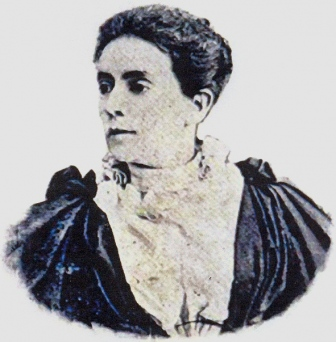3.8.3 The poetic work of Nieves Xenes (1859 – 1915)

Nieves Xenes’s poems were not published in full until after her death, in a volume compiled and prefaced by Aurelia Castillo de González. Her decision to dedicate herself to domestic life meant she stopped writing, so her work was not very prolific, but it is worth mentioning as an example of the female lyric poetry of this period.
Despite having only completed primary school, she demonstrated a strong poetic predisposition from an early age, which she perhaps struggled to suppress in order to adapt to the demands of marriage or other social institutions. She regularly attended the literary gatherings of José María de Céspedes and Nicolás Azcárate, which earned her some recognition, always tempered by her gender.
He received several awards, including the natural flower at the Colla de Sant Mus Floral Games for his text “The Poet” in 1887. His poem “Julio” also earned him the gold medal from the magazine “Cuba y América” in 1907.
Although her work is not prominent in the panorama of Cuban poetry -although it is in terms of its cultivation by women, normally relegated by social coercion and the almost total absence of educational opportunities- certain glimpses of a nationalist thought stand out in her verses -perhaps more intuitive than the result of a well-thought-out ideology- that rejected colonialism, which can be appreciated in verses dedicated to Luisa Pérez de Zambrana, and in her poem entitled “A una tórtola”, from which fragments are reproduced respectively:
“Surrendered, hesitant and without support,
goes along paths of steep rocks,
on the Olympic head wearing
the light of genius and the shadow of pain.
(…)
Unhappy homeland that after a heroic struggle,
fallen in pitiful prostration,
you lower your sad, stained forehead
of eternal slavery with the stigma!”
“To a turtledove
Unfortunate little bird,
Why is it overflowing?
such intense bitterness
your beautiful voice?
Why your accent
more than accent
seems sad lament?
(…)
Why then are you always
sad and tearful,
and being beautiful and free
aren’t you happy?
What bitter sorrow
your candid life
filled with anguish?
(…)
Do you feel like me perhaps,
innocent bird,
of sayings that do not exist
burning longing?
Does it disturb your calm?
This anxiety that I carry
always in the soul?
(…)
Beautiful and tender little bird,
your sad complaint
exhale again tomorrow
next to my fence;
that my sorrows
lulls the lullaby
of your songs.”
In the poem dedicated to Luisa Pérez de Zambrana, there is an implicit homage to feminine poetry; in the second, there is an intertextual dialogue with “La fuga de la tórtola” by José Jacinto Milanés, in which there is a latent questioning of what freedom is, around which interpretations can be woven that lead to the political sphere.
Throughout his life, he contributed to various periodicals, including El País, La Lotería, El Triunfo, Revista Cubana, Letras, El Fígaro, and La Habana Elegante. Like Aurelia Castillo, he was a member of the National Academy of Arts and Letters.








